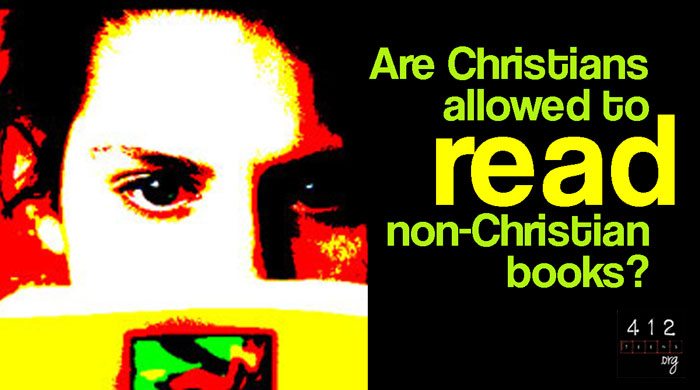Is it okay to read secular or non-Christian fiction?

Secular fiction, like Christian fiction, spans the spectrum of quality, content and story type and style. However, fiction written by non-Christian authors is more likely to have sexual content, profanity and dealings and scenarios that generally wouldn't show up in Christian fiction. That's not to say that it never happens, but it's certainly less likely.
The line between "secular" and "Christian" fiction isn't always a clear-cut one. There's "Christian" fiction that people will assume is safe due to its "Christian" publishing house or author, yet the story may present a horrible or confusing theology which plants seeds of heresy or doubt in the reader's mind. On the other hand, there are many non-Christian authors who write stories that may never mention God, yet they shine forth the Truth in a more Biblically accurate manner than its Christian counterpart.
The REAL Questions
Instead of asking, "Should I read secular fiction?" what we really should do is ask a series of questions about each individual book that we are considering. Questions like:
- Will this novel be helpful and edifying for me?
- Will anything good come from reading this?
- Will reading this compromise my beliefs or tempt me to go against my convictions?
- Am I trying to find a biblical loophole to justify what my flesh wants, or is this really okay for me individually?
As Christians, we have the freedom to read books that are available to us. But we should keep in mind what Corinthians 10:23 says: "All things are lawful, but not all things are profitable. All things are lawful, but not all things edify."
The Bible might not give an overall ultimatum on our media intake choices, but it does give principles to follow to help us make the best choices as to what would be and would not be good for us.
Philippians 4:8 says, "Finally, brethren, whatever is true, whatever is honorable, whatever is right, whatever is pure, whatever is lovely, whatever is of good repute, if there is any excellence and if anything worthy of praise, dwell on these things."
You Know What Makes You Tick
Given that secular novels are more inclined to have certain elements of "objectionable content," the believer should be aware of their personal boundaries and sensitivities. Is picking up a Stephen King novel going to make it more difficult for you to keep your language clean? Then you should pass. Is reading a romance novel with sexual content going to make you struggle with lustful or covetous thoughts? Then you should avoid it.
On top of examining each story as it relates to your own convictions, if you feel the Holy Spirit telling you to stay away from non-Christian novels in general, then you should stay away from them. We are not to "grieve" (Ephesians 4:30) or "quench" (1 Thessalonians 5:19) the Holy Spirit. If He says "no," then we are to obey and listen. The Holy Spirit's voice is the final say no matter what we think.
Christian Doesn't Always Mean Christ-like
One thing to be on guard against is that slapping a "Christian" label on a novel (or anything else for that matter) is not necessarily an indicator that the thing contains biblical Truth. Just because something claims to be Christian or is published by a Christian publishing house that does not mean our guard should be totally down in what that book might be trying to teach us.
Every book you want to read should be put to that series of questions—regardless of whether it is labeled as "Christian" or "secular."
Fictional storytelling is a powerful and beautiful tool. Jesus used it with His parables. C.S. Lewis, an apologist and author, also used story as a means to encourage people to think through what they believed. When it comes down to deciding what stories a Christian should read (or watch or listen to for that matter!), it always comes back down to motive and discernment (2 Corinthians 11:13-15; 1 John 4:1). We are to always be comparing things to Scripture no matter what spiritual labels have or have not been put on them.


TL;DR
No matter what label is slapped on a book, even if it is "Christian", examine each story as it relates to your own convictions. Check your motivations for wanting to read the book (2 Corinthians 11:13-15; 1 John 4:1). If you feel the Holy Spirit telling you to stay away from any given novel, then you should stay away from it (Ephesians 4:30; 1 Thessalonians 5:19).

Writer/Editor: September Grace
September is an avid film nerd from growing up on weekend trips to Universal Studios Hollywood. She is passionate about the intersections of Christian spirituality, faith, and storytelling in popular culture. Outside of 412teens and digging up obscure horror flicks from the 2000s, she works as a freelance developmental editor and acquisitions consultant while comforting her clingy feline floof, Faust, from the anxiety of existence.
